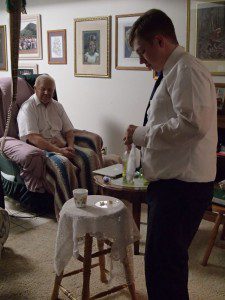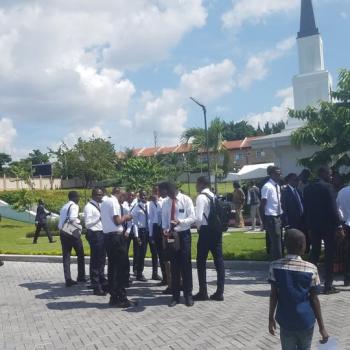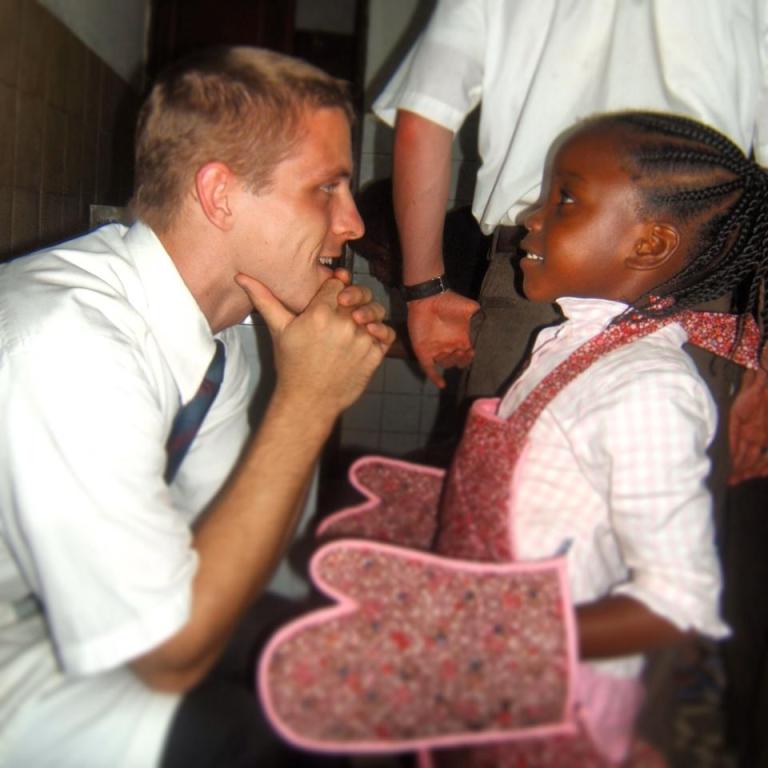
Five years ago, I wrote this to a missionary in the Congo–one I had later as a student.
My letter:
Dear Elder–On Thursday, I went swimming fairly late at night. I did some easy kicks, then hit butterfly hard and lashed the water with full strokes. I started getting angry at the whole situation. I felt so ripped off that for four years, when my son has said, “You don’t know the real me,” he meant it. I felt like I had missed out on a huge portion of this kid I gave birth to, because he had been stoned much of the time. By the time I got home from my swim, I was still mad. I knew that it had to be resolved somehow, and that I could not control my son. Somehow, I had to find peace beyond the current trial. So I talked to my son about what I was planning. I told him that I was going to have my husband give me a blessing.
My son stayed in the room as Bruce blessed me. The line I remember most vividly is this one: “I bless you that your memory will be sanctified as the larger picture unfolds, and you will view all of the difficulties and the trials you’re enduring now with gratitude and love.” Isn’t that lovely—the idea that our memories can be sanctified? Did I ever tell you about the day I gave birth to my son? No epidural, so I knew how painful the final push would be, and I
said to Bruce right before the last labor pain hit, “I don’t want to do this.” He answered, “It’s too late.” I pushed and it was every bit as bad as I knew it would be. I screamed. But then my son was born and the pain was over. A couple of hours later, I had a rather miraculous experience in which I fully remembered—even relived—the birth, except without any pain. And I kept repeating in my mind, “How beautiful. How beautiful.” The fact that this child had come through me.
So, in line with the idea of sanctified memories, I’ve been thinking of two stories from the New Testament: The raising of the daughter of Jairus and the raising of Lazarus.
Whenever we lose someone, whether it’s to death, sin, their choice to leave, or our choice, we tend to blame—and we’re certainly desperate for an immediate solution. Elder Willis says, “The Lord is never frantic.” But we mortals, when faced with such calamities, do get frantic.
In Mark 5, the sick girl’s father, Jairus, a leader of the synagogue (and so, we might guess, someone not all that likely to approach Jesus) finds the Savior, kneels at his feet and pleads with him to lay hands on his daughter so that she might be healed.
Then, though we assume that Jairus remains by the Lord’s side, the scriptures take us to another event—where a woman who has had an issue of blood for twelve years touches the hem of Jesus’ garment, and he feels “virtue” (strength) go out of him because of the power of her faith. (Btw, the woman’s issue of blood refers to constant menstruation, and means that she has been in an “untouchable” circle for twelve years. The Levitical law required that menstruating women not associate with men until they were cleansed. For twelve years, this woman has been “untouchable.”)
Then, we’re back with Jairus, still at Jesus’ side. They go to his home, though word has already come that the child has died. Jesus tells Jairus to “be not afraid, only believe.” They enter the place of mourning, where everyone is wailing because the girl has died. Jesus asks calmly, “Why make ye this ado and weep?” Then he approaches the girl and says, “Talitha, arise.” The scriptures interpret “Talitha” as “damsel,” but there is another Hebrew meaning: “Little lamb.” Imagine the affection. “Little lamb, arise.” (It likely also refers to her hair, which was perhaps like wool.) She opens her eyes. Then Jesus, so aware of her need, simply asks for somebody to bring her food. He performs this mighty miracle and then is instantly concerned for the mundane reality: The child must be hungry.In the story of Lazarus, the dead man’s sisters say to the Lord, “If thou hadst been here, our brother had not died.” But Jesus understands his priesthood. I’ve wondered what it was like for Lazarus. Surely, he was asked if he was willing to resume mortal life, and he must have known that he would be a testimony of the Lord’s power. When the command, “Lazarus, come forth!” was given, he obeyed.
When we read either story, we already know the ending, so the whole picture is available to us. We read it with a sense of the miracle already in our minds.
So here I am, a fifty-something mother of a kid who is spiritually ill; a kid who has, for years, deceptively taken substances into his body. I have been flailing. The Provo Temple is closed for another month, and I haven’t been to the temple since we went to Europe. (Usually, I’m there every week to help with the Spanish session.) My husband’s blessing to me—which included much more than the sentence I quoted—was like the Savior saying, “Be not afraid, only believe,” or “Why make ye this ado?” In other words, DON’T YOU BELIEVE I, THE LORD, HAVE POWER?
I do have a strong hope that in five years, I might see my son as a strong, righteous man who has chosen to do good things.
I cannot control my son any more than your parents could control you, or any more than Jairus and his wife could control the end of their daughter’s life. This is the time for faith. I have to go a step at a time, trying not to get frantic or flail if I think I’m drowning, but to believe that the Lord really is with me and Bruce as we do this most important work of raising our children.
It has been almost–but not quite–five years since I wrote that email. Changes?
My son is becoming a righteous man, one who values peace and integrity. My other children continue to progress in their own endeavors. Perhaps the biggest change has been in me. I am not frantic. I am not fearful. I understand that the more I love my children, the more they will love themselves and others. This is my season of learning, not of mourning. I am only mid-way through the story. As I always told my children when thy reported someone else’s messing up: “The end of the story hasn’t been written yet.”
I write this now, on the 19th of November, 2013:
Dear Margaret at age 63: I think our children are settled now, and the clamoring voyages of youth have come full circle. Do you even remember how hard it got at the peak of the trials, when you felt so betrayed that you couldn’t even see your children’s pain (which was far worse than your own)? Do you remember how helpless you felt and how resistant to giving love? Do you remember praying for strength and peace and finding both–particularly in the temple? Do you continue to thank God for miracles? (I assume they’re still happening.) You have a teenaged granddaughter now. How is her mother? Are you strengthening her? Are you doing good things for good reasons? Are you noticing how glorious the vista is–all down the years–now that it has been sanctified by the completion of a few stories and the kind haze of memory? And those shadowy places–you do know, don’t you, that they will be beautified as well, and will be made to shine.
Dear reader: Feel free to write yourself a letter.












